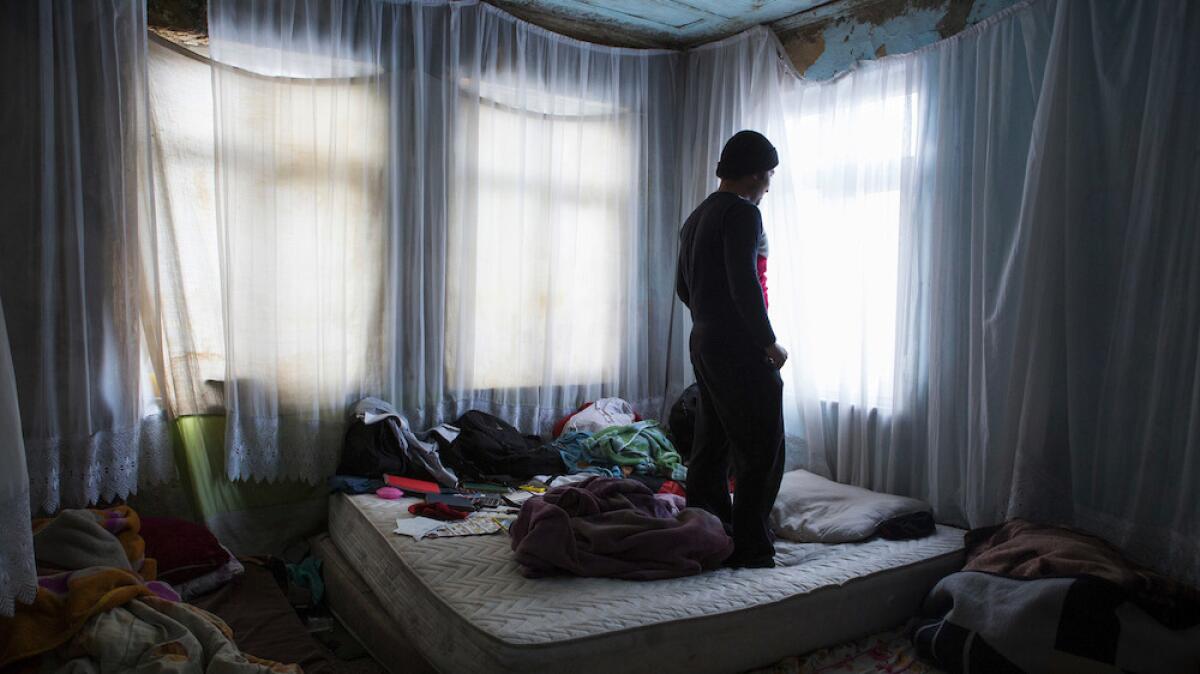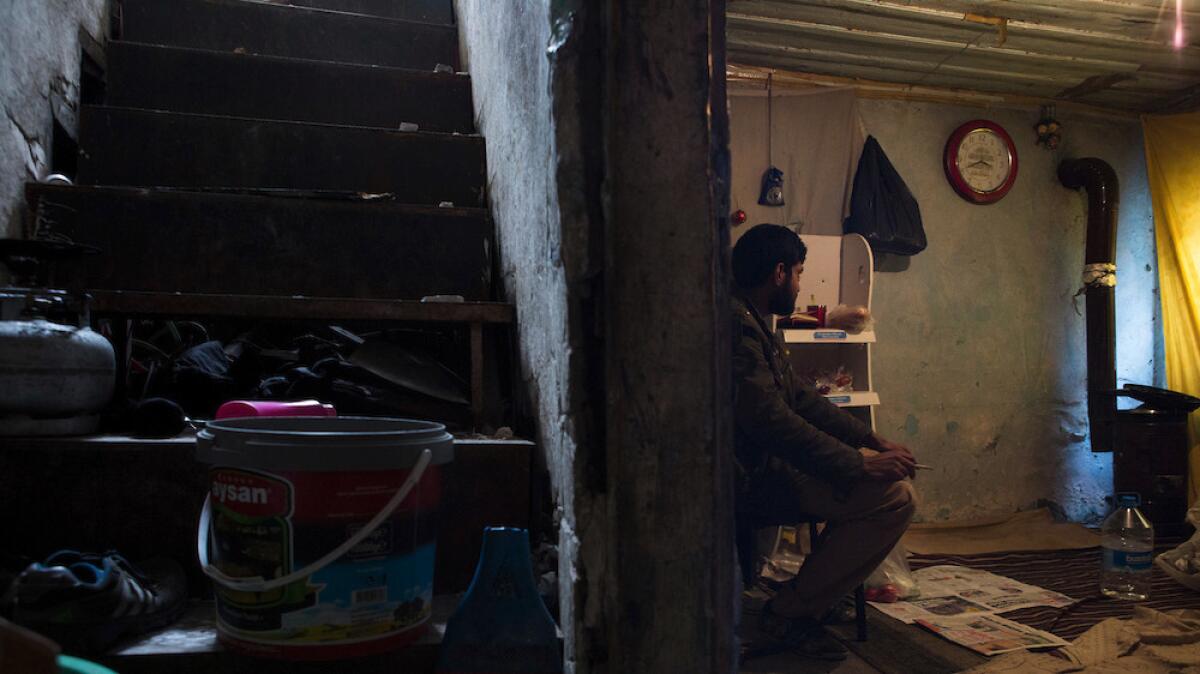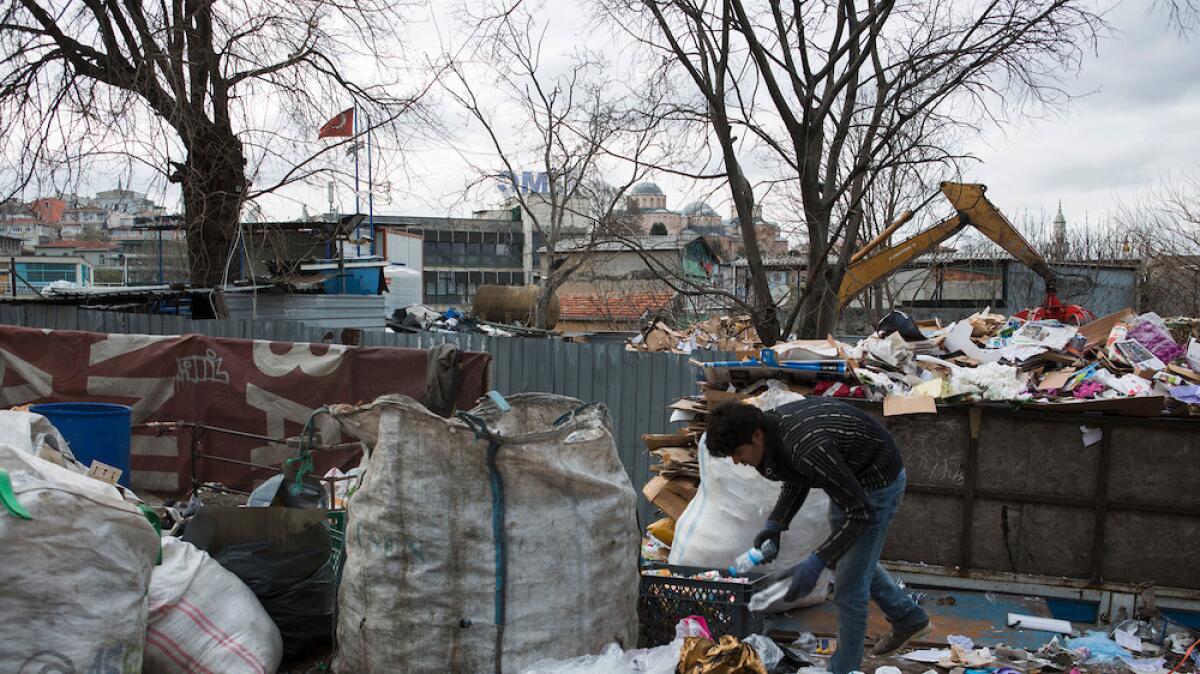‘I can’t stay here and do this.’ A harsh reality for Afghan refugees in Istanbul is masked with lies to family back home

- Share via
Reporting from Istanbul, Turkey — The men sat on dirty, stained mattresses in a cramped Turkish apartment eating eggs cooked using a propane tank.
One wall was pale brown from water damage and mildew. Along a side wall, where the yellowish paint was peeling in chunks, hung a green, red and black Libyan flag, the closest match the mostly Afghan residents could find to their home flag.
The two-bedroom space on a road of deteriorating buildings in Istanbul was cramped at best, with 30 or 40 refugees — men only -- sharing it at any given time at a total cost of about $1,000 monthly.
The apartment is in the shadows of the Suleymaniye Mosque, a sprawling 16th century Ottoman religious complex that has been listed as a World Heritage site by the United Nations, but the conditions the men find themselves in are anything but opulent.
“We wouldn’t live like this in Afghanistan,” said Hares Pashtun, 23, who came to Istanbul from the eastern Afghan province of Nangarhar.
The men were among the more than 3 million refugees in Turkey — mostly from war-torn Syria — fleeing violence or poverty and looking for jobs or other ways to improve their lives, which for many means trying to get to Europe.

The United Nations has said more than a million migrants arrived in Europe last year, most by traveling through Turkey and crossing the Aegean Sea to Greece. The flow has been stemmed this year by a European Union agreement with Turkey, restrictions by Balkan countries and other obstacles, though more than 300,000 migrants have reached Europe by sea, officials said.
At the Istanbul apartment, tales of disappointment were plentiful as some men said they were duped by charlatans or disoriented by unrealistic dreams, and many, if not all, encountered circumstances of bad luck, bad choices or both.
Pashtun and a 25-year-old friend, Mosa Rahbar, were among those who recently shared their experiences of leaving Afghanistan, making a go of it in Istanbul and contemplating whether they were better off returning home. They have little by way of education, but say they have done “every kind of job” in Afghanistan and along their journey.
Rahbar said when he left Afghanistan nearly three years ago other men had filled his head with the possibilities of making a good living in a new place. Those hopes helped him get through the weeks-long trek through Iran and eastern Turkey, he said.
“They said to us: ‘You will drive taxis and make hundreds of euros each month,’” Rahbar said.
Instead, Rahbar and Pashtun, who left home about 2½ years ago, found themselves, like so many refugees, sleeping in parks and doing odd jobs in Istanbul and other Turkish cities.
Pashtun said he had worked at a leather factory and construction sites and helped raise livestock, but after each experience he was left broke and tired in Istanbul and Izmir.
“Every time I would go to [employers] and ask for my wages, they would just say: ‘I have no money, besides I paid for you to eat and live.’”
Last year, Rahbar and Pashtun turned to scavenging through trash as a reliable means for what many others also found to be a steady, if small, income.
Every day, starting at 5 a.m., dozens of refugees push giant canvas sacks through the streets of Istanbul as they collect refuse. They return home after nine or 10 hours circling the city streets, exhausted, towing sacks that tower over them and can weigh as much as 330 pounds.
“If it wasn’t for garbage collection, no Afghan would make money here,” Rahbar said of the 40 to 80 liras ($13 to $26) he makes per day for sorting and collecting plastic, cardboard, metal and glass.
Many of the men, however, feel uncomfortable performing a job usually relegated to young boys in Afghanistan, and virtually all of them lie to their relatives.
“My father asked me if I was OK, if I had found a good job,” said Wasim Ahmad, 21, who had been in Turkey for several months after arriving from Kabul. “I lied to him and said I worked at a restaurant. How could I tell him I spent $1,500 to get here only to end up a trash collector?”

When the men post pictures on social media, they are carefully staged shots outside Istanbul’s numerous historic landmarks or fashionable restaurants, places they could never afford.
“I thought ... I will make money during the day and be in discos at night,” Pashtun said.
Abdul Malik Quraishi, consul general at the Afghan Consulate in Istanbul, said many migrants who try to make a go of it in Turkey get frustrated and want to leave. In the last five months, more than 4,000 Afghans have approached the consulate wanting to be sent out of the country, officials said.
But Quraishi said until refugees and migrants apply for asylum, it’s very difficult to serve them. The consulate’s ability to provide assistance is further complicated by refugees seeing Turkey as a transit point.
“There have been days when hundreds of people are lined up outside the consulate asking for help or for deportation,” he said.
By the time many Afghan refugees reach Turkey, at a cost of about $1,500 each, they have either spent a bulk of the money they have gathered for their journey, borrowed money, or have had their money and belongings taken by smugglers.
Ahmad said he had spent weeks looking for anyone who could help him get deported.
“I don’t have any more money, but I can’t stay here and do this,” he said, pointing to the stacks of garbage that had yet to be sorted outside the apartment.
For many refugees and asylum seekers outside the camps, it is a struggle to survive.
— Tomas Bocek, Council of Europe’s special representative on migration and refugees
According to a recent report by the Council of Europe humanitarian organization, about 20% of the refugees in Turkey are able to find shelter in dedicated camps. In addition, efforts to provide work permits and jobs for refugees are falling short, the report said.
”For many refugees and asylum seekers outside the camps, it is a struggle to survive,” Tomas Bocek, the 47-nation council’s special representative on migration and refugees, said in the report. “Harsh living conditions may be a very important push factor for those who decide to leave for other Council of Europe member states.”
Several of the Afghan refugees said they had given up on their dreams and were planning to go home.
“We can be menial workers here,” Pashtun said, “or we can be menial workers in our own land surrounded by our families.”
Latifi is a special correspondent.
MORE WORLD NEWS
Would you like a little salt in that shampoo? A Taiwan company has you covered
How Honduras helped vice presidential candidate Tim Kaine find his mission in life
Taliban fighters launch offensive against northern Afghan city of Kunduz
More to Read
Sign up for Essential California
The most important California stories and recommendations in your inbox every morning.
You may occasionally receive promotional content from the Los Angeles Times.










